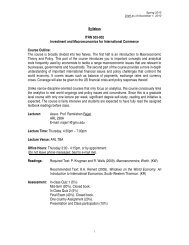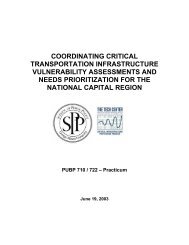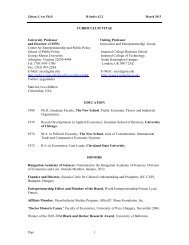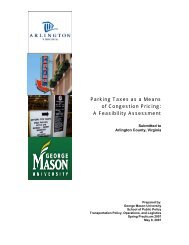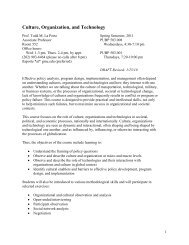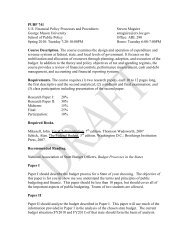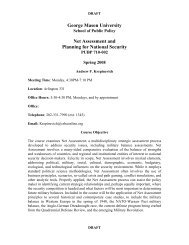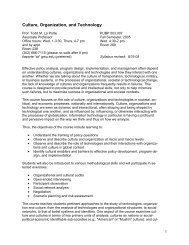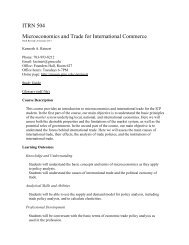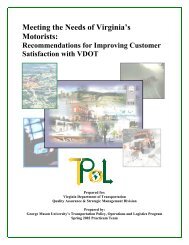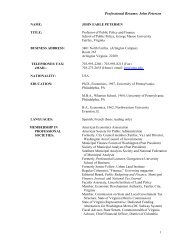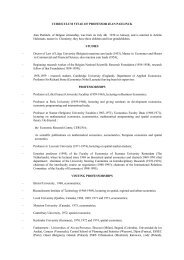PUBP 502-007 - George Mason University
PUBP 502-007 - George Mason University
PUBP 502-007 - George Mason University
You also want an ePaper? Increase the reach of your titles
YUMPU automatically turns print PDFs into web optimized ePapers that Google loves.
School of Public Policy Fall 2008<br />
<strong>George</strong> <strong>Mason</strong> <strong>University</strong> 218 Finley<br />
Professor Pfiffner 703-993-1417<br />
Governance and Policy Processes<br />
<strong>PUBP</strong> <strong>502</strong><br />
Purpose of course<br />
Governance is a term that includes, but is not limited to government. It implies the broad range<br />
of rules, regulations, relationships, and institutions that come together to produce the systems<br />
within which all societies operate. The purpose of this course is to take a broad view of<br />
governance in a U.S., comparative, and international context. First, democratic governance in<br />
the United States is examined and compared with other modern democracies. Second, focusing<br />
on the United States as a case study, important changes in the execution of public policy are<br />
examined as increasing portions of public policy in democratic, market-based nations are carried<br />
out by private sector and non-profit organizations. Third, the course will examine case studies<br />
in comparative public policy, focusing on differences in economic, political and governmental<br />
systems. The course will also examine international development, the European Union, and the<br />
place of the nation state in an increasingly interdependent world with a globalized economy.<br />
Objectives<br />
The goal of the MPP Program in the School of Public Policy is to prepare students for<br />
professional positions in public policy, including the executive or legislative branches in the<br />
national, state, or local governments; private sector businesses dealing with public policy; and<br />
non-profit organizations concerned with public policy. Students should view this class as an<br />
opportunity for professional development.<br />
Upon completion of this course, students will be able to identify and assess the impact of a<br />
variety of governmental structures; be familiar with contemporary issues of governance;<br />
understand the varieties and implications of intersector cooperation; be aware of the changing<br />
dynamics of national and sub-national governance; and be conversant with international<br />
dimensions of governance.<br />
Required texts<br />
John Kingdon, America the Unusual (Belmont, CA: Wadsworth/Thompson Publishing, 1999).<br />
Elliott D. Sclar, You Don’t Always Get What you Pay For: The Economics of Privatization<br />
(Ithaca New York: Cornell <strong>University</strong> Press, 2000).<br />
Francis Fukuyama, State Building: Governance and World Order in the 21 st Century<br />
(Ithaca, NY: Cornell <strong>University</strong> Press, 2004).<br />
Alberto Alesina and Edward L. Glaeser, Fighting Poverty in the US and Europe<br />
(Oxford, UK: Oxford <strong>University</strong> Press, 2005).<br />
1
In addition, a number of articles and chapters will be assigned, as specified below or announced<br />
in class. Some course assignments will be sent to the class via e-mail to students’ GMU e-mail<br />
addresses. So, even if you do not regularly use your GMU e-mail account, be sure to open it and<br />
place a forwarding address to the account you use regularly so that you can get GMU, SPP, and<br />
class announcements. Also, be sure to empty your account regularly, because if you do not and<br />
it exceeds the limit, you will not receive incoming e-mail until you have cleared the space.<br />
Deleting forwarded e-mails does not delete them from your GMU account.<br />
Class Format<br />
The course will be conducted as a seminar rather than in a lecture format. Thus each week’s<br />
assignment must be read before class discussions each week. Active participation in class<br />
discussions is mandatory. Professionals in public policy must be able to speak effectively in<br />
small groups and to make presentations of their work. The only way to learn these skills is to<br />
practice, so students are expected to contribute to discussions and will be required to present<br />
summaries of course readings and their own writing. It is expected that students will keep up<br />
with policy developments in matters relating to this course by reading a good newspaper daily.<br />
Please turn your cell phone ringer off.<br />
Classroom Courtesy<br />
Civility and respect toward all members of the class are expected; disagreements among<br />
members of the class (or with the instructor) are useful and illuminating, but mutual respect is<br />
mandatory. Taking notes on your laptop is fine, but playing games, checking e-mail, or reading<br />
sports scores is not. If you do these things when I am talking, I will merely be annoyed. But if<br />
you do these things when another student is speaking, you will lose points on your class<br />
participation grade.<br />
Course Evaluation<br />
Midterm Quiz 20% Oct. 20<br />
Paper No. 1: Policy Memorandum 15% Oct. 27: due<br />
Oral Presentation of Memorandum 10% Oct. 27: begin<br />
Final Quiz 15% Dec. 1<br />
Class Participation 15%<br />
Paper No. 2: Comparative Policy Analysis 25% Dec. 1: due<br />
For purposes of this course, the grades of A or A- are reserved for sustained excellence and<br />
outstanding performance on all aspects of the course. The grades of B and B+ are used to<br />
denote mastery of the material and very good performance on all aspects of the course. The<br />
grade of B- denotes marginal quality work that is not quite up to graduate level standards. The<br />
grade of C denotes work that may be adequate for undergraduate performance, but is not<br />
acceptable at the graduate level. The grade of F denotes the failure to perform adequately on<br />
course assignments.<br />
Attendance in class is required and will be taken into account in evaluation for the course. While<br />
it is possible that the requirements of full time jobs may occasionally conflict with class times,<br />
missing more than two class sessions will make it virtually impossible to earn a grade better than<br />
2
B for the course. Missing more than three sessions will make a grade of C likely.<br />
Office Hours<br />
Mondays: 3 - 4pm (Arlington)<br />
Tuesdays: 3 - 4pm (Fairfax)<br />
Wednesdays: 3 - 4pm (Fairfax)<br />
Office: 218 Finley; Phone: 703-993-1417; e-mail: pfiffner@gmu.edu<br />
My office is Room 218 in the Finley Building on the Fairfax Campus. I am usually in<br />
my office four or five days a week and students are welcome to drop by at any time to<br />
talk. You may call me at any time (703-993-1417) or leave a message if I am not there.<br />
If you write to me via e-mail (pfiffner@gmu.edu), please put <strong>PUBP</strong><strong>502</strong> in the subject<br />
field, and I will get back to you quickly. Since this course is offered on the Arlington<br />
Campus, I will try to be on campus by 3:00pm afternoons before class, though at 4pm, I<br />
will be preparing for class until 4:30. I will also be available for consultation after each<br />
class.<br />
Outline of the course<br />
Weekly Topics and assignments:<br />
1. Introduction to the Course and Overview of the Semester<br />
(25 August)<br />
2. American Exceptionalism (i.e. the U.S. is different, not necessarily better)<br />
(8 September)<br />
Professional Vita or Resume due in class.<br />
Assignment:<br />
The Constitution of the United States of America, Articles I and II<br />
James Madison, Federalist No. 10<br />
James Madison, Federalist No. 51<br />
[The Constitution and the Federalist papers are easily found on the net. Merely<br />
type the terms into Google, and it will take you to a number of sites with the<br />
documents which can be downloaded.]<br />
John Kingdon, America the Unusual, whole book.<br />
3. Constitutionalism and the Rule of Law<br />
(15 September)<br />
Assignment:<br />
Seymour Martin Lipset, “The Social Requisites of Democracy Revisited,”<br />
American Sociological Review Vol. 59, No. 1 (February 1994), pp. 1-22.<br />
Access through Library data bases or JSTOR.<br />
Pfiffner, Power Play, Ch. 4, pp. 56-68, Ch. 9, pp. 229-249 (e-mail).<br />
3
4. Governing Markets: neo-classical economics and the standard market model<br />
(22 September)<br />
Assignment:<br />
Elliott D. Sclar, You Don’t Always Get What you Pay For: The Economics of<br />
Privatization, Chapters 1-4, pp. 1-93.<br />
5. Markets and Government: state and local cases<br />
(29 September)<br />
Assignment:<br />
Elliott D. Sclar, You Don’t Always Get What you Pay For, Ch. 5-7, pp. 94-168.<br />
6. Bureaucracy and Public Management<br />
(6 October)<br />
Assignment:<br />
William G. Ouchi, “Markets, Bureaucracies, and Clans,”<br />
Administrative Science Quarterly Vol. 25, No. 1(March 1980), pp. 129-141.<br />
Max Weber, Bureaucracy: “Characteristics of Bureaucracy,” and<br />
“The Position of the Official.” (about 3-5 pages).<br />
James Pfiffner, “Traditional Public Administration versus The New Public Management:<br />
Accountability versus Efficiency,” (e-mail)<br />
7. International Organizations: The European Union<br />
(14 October TUESDAY)<br />
Guest seminar by Professor Desmond Dinan, Jean Monet Professor, SPP<br />
Assignment:<br />
Desmond Dinan, “Reconstituting Europe,” found at:<br />
http://mason.gmu.edu/~pubp<strong>502</strong>/<br />
Jack Rakove, “Europe’s Floundering Fathers,” Foreign Policy No. 138<br />
(Sep.-Oct 2003), pp. 28-38.<br />
8. Economics and Welfare Policy<br />
(20 October)<br />
Midterm Quiz on reading for Weeks 1-8 (30-40 minutes)<br />
Assignment:<br />
Alesina and Glaeser, Fighting Poverty, Ch. 1-3, pp 1-77<br />
9. The Nature of Political Institutions<br />
(27 October)<br />
Assignment:<br />
Alisino and Glaser, Fighting Poverty, Ch. 4-5, pp. 77-133.<br />
Policy Memorandum due in class. In-class oral presentations begin.<br />
10. Redistribution Policies<br />
(3 November)<br />
Assignment:<br />
Alisino and Glaeser, Fighting Poverty, Ch. 6-8, pp. 133-233.<br />
4
11. Contrasting Governmental Structures<br />
(10 November)<br />
Assignment (read in order):<br />
Juan J. Linz, “The Perils of Presidentialism,” Journal of Democracy<br />
Vol. 1, No. 1 (Winter 1990), pp. 51-69.<br />
Donald Horowitz, “Comparing Democratic Systems,”<br />
Journal of Democracy Vol. 1, No. 4 (Fall 1990), pp. 73-79.<br />
Seymour Martin Lipset, “The Centrality of Political Culture,”<br />
Journal of Democracy Vol. 1, No. 4 (Fall 1990), pp. 80-83.<br />
12. State Building: economics and public administration<br />
(17 November)<br />
Assignment:<br />
One page proposal for Paper No. 2 due in class (including outline and sources).<br />
Fukuyama, State Building, Ch. 1-2, pp. 1-92.<br />
13. Weak States and Democracy<br />
(24November)<br />
Assignment:<br />
Fukuyama, State Building, Ch. 13-4, pp. 92-123.<br />
Larry Diamond, “The Democratic Rollback,” Foreign Affairs (March/April 2008).<br />
14. Globalization and the Nation State<br />
(1 December)<br />
In-class Quiz on readings from Section 9-14 (30-40 minutes)<br />
Final Paper, Comparative Case Study, Due in Class<br />
Assignment:<br />
Steven Krasner, “Sovereignty,” Foreign Policy (Jan./Feb. 2001), p. 20.<br />
Edward Luck, “Rediscovering the State,” Global Governance<br />
(Jan.-Mar. 2002) Vol. 8, No. 1, p. 7.<br />
Written Assignments<br />
Each of the written assignments must be submitted in hard copy, but an electronic copy must be<br />
submitted in addition so that it can be checked through the School’s data base service that<br />
surveys published and non-published papers, articles, and books for possible plagiarism.<br />
Do not put your papers in a special cover; merely staple them in the upper left corner. All papers<br />
must be double spaced and in at least 12 point font on standard 8.5 x 11 inch paper. Papers must<br />
be written specifically for this course, not recycled from a previous assignment.<br />
The syllabus paper requirements hold for all students. Anything the instructor says orally should<br />
not be understood to waive any of the paper requirements on the syllabus. If you think that I<br />
have made an exception for you, e-mail me to confirm your understanding.<br />
In evaluating papers, degree-of-difficulty will be considered. Just as a perfectly executed swan<br />
dive may not receive as high a score as a slightly flawed full gainer with a twist, a paper that<br />
5
engages a difficult question or takes a creative approach to a public policy issue will receive<br />
more credit than a paper that takes a relatively straight-forward issue and addresses it in a<br />
pedestrian manner.<br />
Your value-added as a policy professional rests in part on your ability to get beneath the surface<br />
of public policy issues. You can only do this if you are familiar with sources that take in-depth<br />
approaches to policy problems. Superficial analyses are useful and can be found in newspapers,<br />
popular magazines, Wikipedia, and policy briefs by think tanks; feel free to use them in your<br />
written assignments. But you will find in-depth analysis of public policy issues in scholarly<br />
sources. Scholarly sources include books, professional journal articles, government reports,<br />
and some think tank pieces. Many public policy journals are available on-line in the GMU<br />
library data bases.<br />
You may not deal with the same topic in both written assignment.<br />
Paper No. 1: Policy Memorandum<br />
Choose a policy or program at the federal, state, or local level in the United States or another<br />
country and analyze the question of whether it should be implemented by a public or private<br />
(business or non-profit) organization. The policy you choose may be currently implemented in<br />
the public or private sector; you may recommend a change in policy or argue for the status quo.<br />
You may use popular newspapers or periodicals for the source of your case, or you may use<br />
scholarly literature; but you must use concepts from the scholarly literature to analyze the case<br />
(textbooks for this course are sufficient for this paper). In all cases be sure to cite your sources.<br />
Address your memorandum to an appropriate official in the legislative or executive branch of<br />
the government you choose. Your position is that of staff analyst and your purpose is to advise<br />
your superior on the merits of the arguments and advisability of contracting out the good or<br />
service in question or implementing the policy with government agencies. Be sure that you<br />
cover both sides of the argument so that your superior will not be blindsided in a public debate<br />
over the issue. You may merely present the pros and cons of public or private provision of the<br />
product or service, or you may make a recommendation to your superior.<br />
The difference between this and an actual memorandum is that you will cite the sources you have<br />
used in analyzing your choice of policy. You can use the course texts as background and as the<br />
basis for your analysis, but you cannot use a case directly from a course text. Be sure to cite the<br />
sources for the information you use. You must cite at least five scholarly sources (aside from<br />
newspapers) for your paper, including two from the assigned course readings. You may want to<br />
read the Sclar book, You Don’t Always Get What you Pay For, before you write your paper.<br />
Your memorandum will be approximately 750 words, three double spaced pages, not including<br />
citations. Citations must be in footnote (preferred) or endnote style. You may NOT use in-line<br />
references. The citation style required in this course is explained later in the syllabus.<br />
Paper No. 2: Research Paper in Comparative Public Policy Analysis<br />
6
The purpose of the second written assignment is to provide an exercise in research and analytic<br />
writing. You will be expected to find and use a number of scholarly sources that are relevant to<br />
your research project.<br />
Choose one public policy area in the United States whose implementation differs from a similar<br />
policy area in another country, for instance, education, health, transportation, drug regulation,<br />
etc. Briefly explain the public policy basis (e.g. law or origin) of the policy in each country, but<br />
your primary focus will be to explain why the two countries deal with the same policy in<br />
different ways. For instance the two countries may have different histories, values, cultures,<br />
governmental structures, distribution of power, or economies.<br />
You must use the concepts and ideas from this course, as well as any others that are useful. You<br />
must cite at least three texts from this course. At a minimum, you must also (in addition to<br />
the citations from the course) use and cite five different scholarly sources, such as articles<br />
from scholarly journals and/or books. Using merely the minimum number of references is not<br />
the most effective way to earn an A. The popular press, newspapers and magazines, are fine to<br />
use; but they are not scholarly sources. You are welcome to use the internet, but be aware of the<br />
nature of the site you are using. It may contain scholarly sources with full citations, which are<br />
fine to use. Be sure to cite all of the internet sources you use, author of the information if<br />
available, date accessed, and full URL. The paper may not exceed eight pages in length (not<br />
including citations).<br />
______________________________________________________________________________<br />
Analytical Writing<br />
For purposes of scholarly writing it is important to write analytically. Analytic writing is more<br />
than merely describing what others have said or describing institutions of government or public<br />
policy making (though description is often an essential aspect of analysis). Analysis involves<br />
more.<br />
In analysis you are asking and answering questions about the causes and consequences of<br />
whatever you are examining.<br />
You are seeking explanations for behavior.<br />
You are developing categories and frameworks that will help us understand political behavior<br />
and generalize insights from one case to other cases.<br />
Ask the question: Of what is this an instance?<br />
When analyzing scholarly writing:<br />
Engage different ideas.<br />
Show how they differ and where they agree.<br />
Compare and contrast.<br />
Contrast different methods of understanding a phenomenon.<br />
What different types of evidence are adduced to make a point?<br />
Contrast different perspectives or approaches to a topic.<br />
Judge whether the reasoning is valid.<br />
Does the author’s evidence support the conclusion of the article?<br />
In Writing an Essay, Remember:<br />
7
The introduction should say what the paper is about and how you will approach the topic.<br />
The paper should address one central question and have a thesis.<br />
The paper should be organized logically, with an evident structure.<br />
The reader should be told how each part of the paper is related to the other parts..<br />
Use subheadings to label different sections.<br />
Outline your paper after it is written to see if it flows logically.<br />
Proofread your paper for spelling and syntax.<br />
Be sure to cite all of your sources and use quotation marks when you use another's words.<br />
Plagiarism is using another’s words or ideas without giving proper credit. Plagiarism is a<br />
major scholarly sin; it is unethical, dishonest, and deceptive, and it has ended some<br />
people’s careers. It can easily be avoided by giving credit where credit is due.<br />
Hints<br />
The singular possessive is formed by adding an ’s (e.g. one president’s term was cut short),<br />
the plural by s’ (e.g. both presidents’ terms were cut short).<br />
The possessive for it is its: its = possessive, it’s = it is.<br />
If you cannot remember the rule for its, do not use an apostrophe and you will be correct.<br />
(That is, use “it is” rather than a contraction and its for the possessive.)<br />
Lead is in your pencil, but led is the past tense of the verb to lead.<br />
Effect is a noun and affect is a verb, almost always - if you do not know the exceptions,<br />
do not violate this rule of thumb.<br />
Cite is short for citation, site is a place (or web location), sight refers to eyes.<br />
Horses have reins, monarchs reign over countries, rain falls from the sky: e.g. The Queen<br />
reigns; the Prime Minister holds the reins of power in Parliament. In London it rains<br />
often.<br />
From William Strunk and E.B. White’s classic, The Elements of Style (NY: Macmillan, 1979),<br />
(pp. vii-viii).<br />
“Place a comma before a conjunction introducing an independent clause.”<br />
“Do not join independent clauses by a comma” (use a semicolon or a period).<br />
“The number of the subject determines the number of the verb.”<br />
“Use the active voice.”<br />
“Omit needless words.”<br />
“Make the paragraph the unit of composition.”<br />
“Revise and rewrite.”<br />
Citations for Research Papers<br />
The purposes of scholarly citations are several:<br />
1) To show the source for a direct quote or fact not commonly known.<br />
2) To give credit for an idea to the author of a work<br />
3) To show the reader that you are familiar with other scholarship on your topic or to indicate<br />
where further information or analysis can be found.<br />
4) You may also use endnotes to explain something in the text or comment on the source.<br />
The intention is to give the reader enough information to find the source you are using so that he<br />
or she can see if you have quoted it correctly, interpreted it soundly, done justice to the author<br />
cited, or do further research on the topic in question themselves.<br />
Format: use the standard Chicago Manual of Style format, also known as “Turabian.”<br />
(Chicago: <strong>University</strong> of Chicago Press, 1982), or most recent edition.<br />
8
Books:<br />
author, title (place of publication: publisher, date), page number(s).<br />
[Titles of books should be in italics or underlined.]<br />
Example:<br />
1. John Kingdon, Agendas, Alternatives, and Public Policies, 2nd ed. (New York:<br />
HarperCollins, 1995).<br />
After the first full citation, you may use a shortened version:<br />
e.g. 2. Kingdon, Agendas, Alternatives, and Public Policies, page number(s).<br />
Articles:<br />
author, title, name of journal (volume, number), page number(s).<br />
[Titles of articles should be enclosed in quotation marks, names of journals underlined or<br />
in italics.]<br />
Example:<br />
1. Theodore J. Lowi, “The State in Political Science: How We Become What We Study,”<br />
American Political Science Review Vol. 86, No. 1 (1992), pp. 1-7.<br />
After first full citation, you may use a shortened version:<br />
2. Lowi, “The State in Political Science,” p. 3.<br />
Chapters in edited Books:<br />
author of chapter (or article), title of chapter, “in” editor of book, title of book (place and<br />
date of publication), page numbers.<br />
Example:<br />
Hugh Heclo, “The Changing Presidential Office,” in James P. Pfiffner, ed. The<br />
Managerial Presidency (College Station, TX: Texas A&M <strong>University</strong> Press,<br />
1999), pp. 23-36<br />
Web Site Citations:<br />
In addition to author, title, etc, include the following information:<br />
full URL, date of access.<br />
Number endnotes consecutively for the whole paper, with each note referring to the number in<br />
the text with the number in superscript or parentheses. Endnote numbers should be placed at the<br />
end of the sentence containing the information being cited. A bibliography of all the sources<br />
used in the paper along with other useful sources may be useful or required.<br />
School of Public Policy on Plagiarism<br />
The profession of scholarship and the intellectual life of a university as well as the field of public<br />
policy inquiry depend fundamentally on a foundation of trust. Thus any act of plagiarism strikes<br />
at the heart of the meaning of the university and the purpose of the School of Public Policy. It<br />
constitutes a serious breach of professional ethics and it is unacceptable.<br />
Plagiarism is the use of another’s words or ideas presented as one’s own. It includes, among<br />
other things, the use of specific words, ideas, or frameworks that are the product of another’s<br />
9
work. Honesty and thoroughness in citing sources is essential to professional accountability and<br />
personal responsibility. Appropriate citation is necessary so that arguments, evidence, and<br />
claims can be critically examined.<br />
Plagiarism is wrong because of the injustice it does to the person whose ideas are stolen. But it<br />
is also wrong because it constitutes lying to one’s professional colleagues. From a prudential<br />
perspective, it is shortsighted and self-defeating, and it can ruin a professional career.<br />
The faculty of the School of Public Policy takes plagiarism seriously and has adopted a zero<br />
tolerance policy. Any plagiarized assignment will receive an automatic grade of “F.” This may<br />
lead to failure for the course, resulting in dismissal from the <strong>University</strong>. This dismissal will be<br />
noted on the student’s transcript. For foreign students who are on a university-sponsored visa<br />
(eg. F-1, J-1 or J-2), dismissal also results in the revocation of their visa.<br />
To help enforce the SPP policy on plagiarism, all written work submitted in partial fulfillment of<br />
course or degree requirements must be available in electronic form so that it can be compared<br />
with electronic databases, as well as submitted to commercial services to which the School<br />
subscribes. Faculty may at any time a submit student’s work without prior permission from the<br />
student. Individual instructors may require that written work be submitted in electronic as well as<br />
printed form. The SPP policy on plagiarism is supplementary to the <strong>George</strong> <strong>Mason</strong> <strong>University</strong><br />
Honor Code; it is not intended to replace it or substitute for it.<br />
(http://www.gmu.edu/facstaff/handbook/ad.html)<br />
10
James P. Pfiffner<br />
<strong>University</strong> Professor<br />
School of Public Policy<br />
Classroom Presentations for Public Policy Students<br />
Oral presentations are an essential component of the skill set of any public policy professional.<br />
And the only way to prepare yourself for public speaking is to practice, that is why presentations<br />
are required in my classes. Most often these are short presentations of about ten minutes. The<br />
following are some hints to help make your presentation most effective.<br />
Professional demeanor and dress:<br />
The assignment should be taken seriously, and dress should be appropriate. Do not wear jeans or<br />
t-shirts; your clothes should project professionalism. Stand up straight and look at your<br />
audience; glance down at your notes when you need to. Do not talk down to your notes; project<br />
your voice to the back of your audience. Try to speak slowly and articulate clearly. Prepare<br />
your talk. Go over your remarks sufficiently so that you are thoroughly familiar with the<br />
material.<br />
Do NOT read your essay:<br />
Speak from an outline; and use your notes effectively by glancing down at them when necessary.<br />
Essays composed to be read are less effective when heard aurally. Speak in your own voice and<br />
explain your ideas in your own words. Tell us about it; don’t read it to us.<br />
Power Point:<br />
You may use Power Point if it helps you present your ideas more effectively; e.g., for<br />
illustrations, diagrams, data, charts, graphs, or an outline. Do NOT put your talk on power point<br />
slides, and do NOT read from the slides.<br />
Organize your remarks:<br />
In your introduction frame the issue you are addressing, and present a brief overview of your<br />
remarks. Make sure the audience knows the main point of your talk so they can listen more<br />
effectively. Organize your talk in a logical manner and ensure that the audience knows how the<br />
separate parts fit together.<br />
Checklist:<br />
Dress professionally<br />
Speak from an outline<br />
Look at the audience and project to the back<br />
Do not read from Power Point slides<br />
Organize your talk effectively<br />
4400 <strong>University</strong> Drive, MS 3C6, Fairfax, Virginia 22030<br />
o) 703-993-1417; Fax: 703-993-2284; pfiffner@gmu.edu<br />
11



